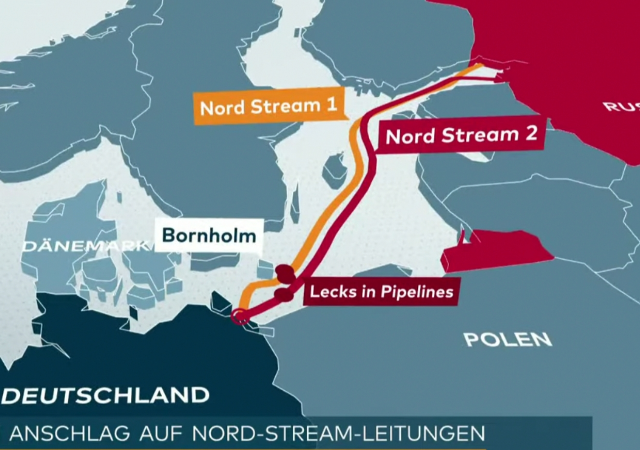German Officials Believe Nord Stream Pipelines Blown Up By “State Actors,” Undersea Repair “Unlikely”

The undersea blasts on Monday, which blew up Nord Stream pipelines from Russia to Germany, were caused by “highly effective explosive devices” and could only have been carried out by “state actors,” German news weekly Der Spiegel reported Thursday, citing sources within the German government and security services.
The blasts that raptured the Baltic Sea pipelines off the coast of Denmark were “comparable to that of 500 kilograms of TNT,” Der Spiegel added.
The damage was apparently caused by military-grade explosives, initial evidence suggests. “One of the explosions measured 2.3 on the Richter scale, which Danish experts described as in line with a powerful bomb from the second world war,” The Guardian newspaper reported.
The incident occurred in relatively shallow waters near the Danish island of Bornholm, roughly 30 miles from the Polish shore. The damaged pipelines are “80-110 meters (265-360 feet) below sea level,” German Deutsche Welle reported.
Hamburg-based Der Spiegel reported the conclusions reached by the German government and security services:
German security authorities believe that highly effective explosive devices were required to disrupt the Nord Stream pipelines in the Baltic Sea. According to Der Spiegel‘s information, it is estimated that explosive devices with an impact comparable to that of 500 kilograms of TNT must have been used to destroy the pipes.The seismic signals registered by various monitoring stations were also included in the estimate. The previously unknown estimates back the assumption that only a state actor could be behind the incident. So far, the [German] government has held itself back from speculating about what caused the disruption of the pipelines.There is a lot of speculation about Russia being behind the incident. The Russian leadership, however, described the incident as international terrorism directed towards Russia. (…)In security circles it was said that divers or a remote-controlled robot could possibly assess the damage[d cite] by weekend.In the best-case scenario, one could thereafter draw initial conclusions about the type of the underwater explosion and the explosives used, according to the security circles. However, it is difficult to predict how many traces can still be found.
The undersea pipelines were engineered to withstand massive amounts of pressure. “They are designed to be tough: each section of the Nord Stream 1 pipeline, the company’s literature says, has a steel case 27 to 41mm thick, in turn surrounded by a concrete coating of 60 to 110mm,” the British newspaper Guardian noted.
“Repair Considered Unlikely”
According to official German sources, the Nord Stream 1 and 2 pipelines, a joint German-Russia project which cost billions to construct, may never be operational again. The Nord Stream 2 alone was built for 11 billion euros, media reports claim.
The “repair of the pipeline is now regarded as highly unlikely,” Der Spiegel said, citing German government sources. “Since the damaged pipelines are currently flooded with seawater, the special inner coating is corroding very quickly,” the magazine explained.
“According to the analysis, once the pipes are flooded, the pipeline can no longer be used to transport gas,” the magazine concluded.
Kremlin Decries State-Sponsored “Terrorism”
Four days after the incident, the Russian government declared the disruption of its gas pipelines an act of terrorism. Moscow dismissed the Western media reports blaming Russia for the alleged underwater strike as “stupid and absurd.
Reuters reported the Kremlin’s response:
Russia said on Thursday that leaks spewing gas into the Baltic Sea from pipelines to Germany appeared to be the result of state-sponsored “terrorism” (…).”This looks like an act of terrorism, possibly on a state level,” Kremlin spokesman Dmitry Peskov said, adding: “It is very difficult to imagine that such an act of a terrorism could have happened without the involvement of a state of some kind”.
(Excerpts from German media reports translated by the author)
CLICK HERE FOR FULL VERSION OF THIS STORY